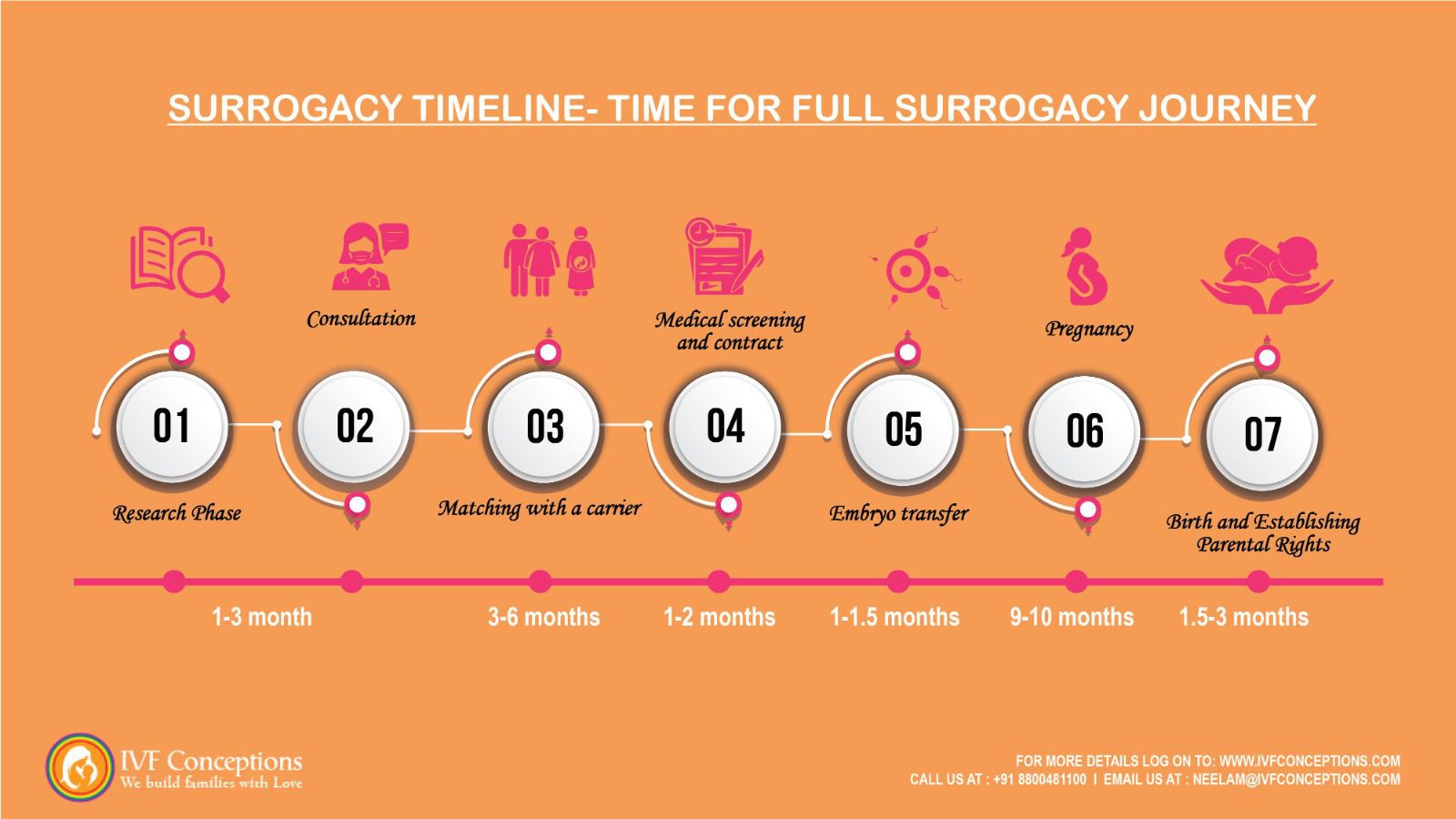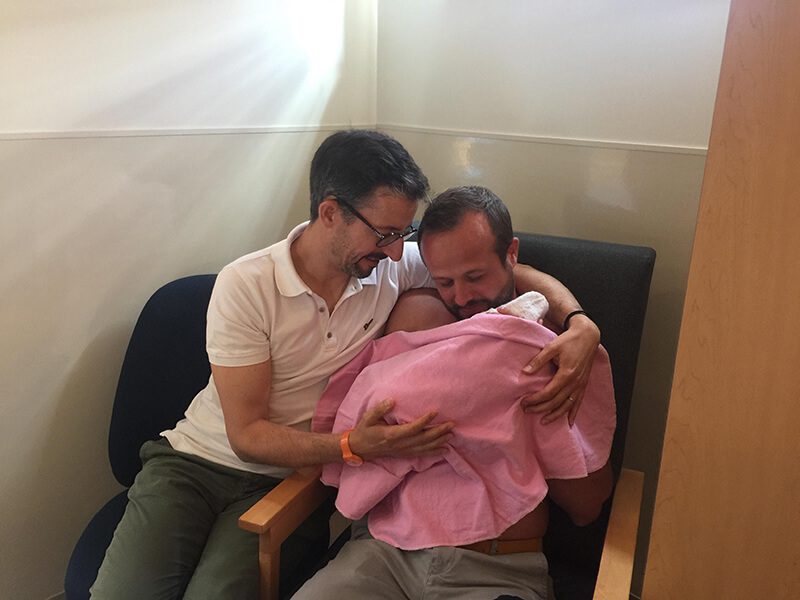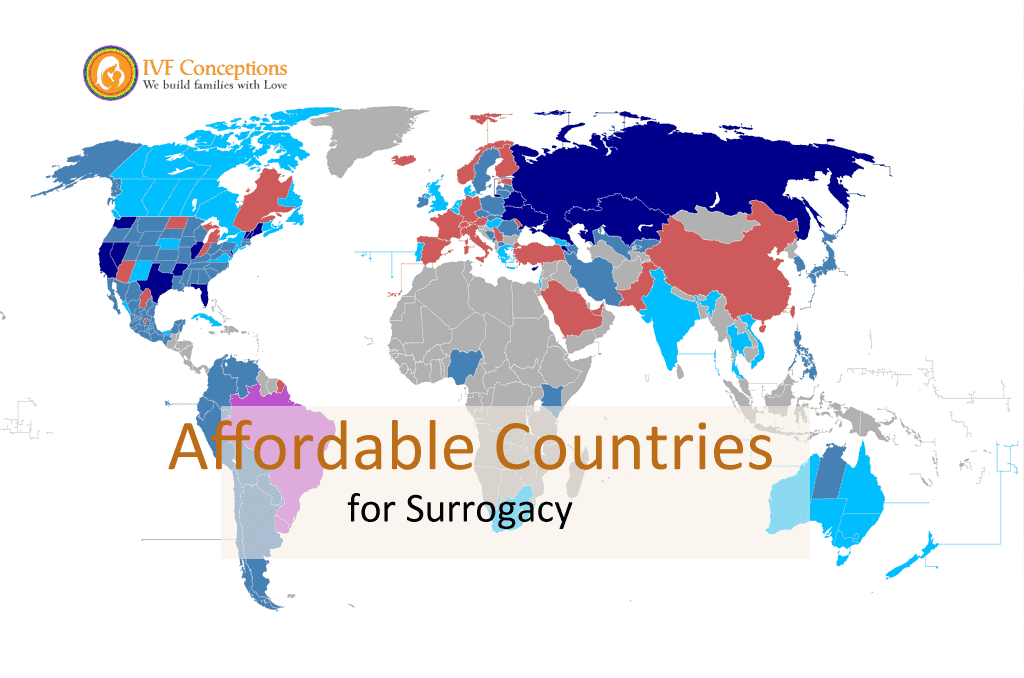Surrogacy for Gay Couples: A Complete Guide to LGBTQ+ Parenthood

Surrogacy has become a viable and rewarding option for gay couples looking to build their families. With advancements in assisted reproductive technology (ART) and increasing legal recognition, more LGBTQ+ intended parents can now pursue biological parenthood. This guide covers the process, best countries, legal aspects, costs, and success rates of surrogacy for same-sex couples.
Why Do Gay Couples Choose Surrogacy?
Surrogacy allows same-sex male couples to have a child with a biological connection using:
✔️ Gestational Surrogacy: An embryo created via IVF using donor eggs and the intended father’s sperm.
✔️ Traditional Surrogacy (Less Common): The surrogate provides both the egg and carries the pregnancy.
Get in touch for a Free Surrogacy Consultancy:
📲 +91-8800481100 ( WhatsApp, Line, Viber)
Additional guides for Intended Parents:
How much does surrogacy cost in Argentina?
Everything You Need To Know (in 2023)
IVF Conceptions Surrogacy Prices & Plans ( in 2023)
 Introduction
Introduction
In recent years, surrogacy has emerged as a significant option for gay couples who wish to become parents. This process involves a woman, known as a surrogate mother, carrying and giving birth to a child on behalf of the intended parents. Surrogacy provides gay males with the opportunity to have a biological connection to their children and experience the joys of parenthood.
It is worth noting that the acceptance and legal recognition of surrogacy for gay males have been on the rise in recent years. Many countries and states have implemented laws and regulations to ensure that same-sex couples have equal rights and access to surrogacy services.
This blog post aims to provide comprehensive information on surrogacy for gay couples, including the process, legal considerations, costs, and available resources for those considering this path to parenthood. Whether you are exploring surrogacy for gay parents, navigating the legal landscape, or curious about the cost of surrogacy for gay couples, this post will serve as a valuable resource for your journey.
Surrogacy for Gay Males
Desire for biological children is a common aspiration among gay males, and yet they often face unique challenges in achieving this dream. Biological connection and genetic continuity can play significant roles in the desire for fatherhood.
However, same-sex couples must grapple with the reality that reproduction through traditional means is not possible for them. Adoption has long been an alternative, but it doesn’t offer the option of a genetic connection. This is where surrogacy becomes an invaluable solution for gay males seeking parenthood.
Surrogacy offers an opportunity for gay couples to fulfill their dream of having children biologically related to them. The surrogate mother carries the pregnancy on behalf of the intended parents, allowing them to have a strong bond with their child from the earliest stages of development.
Surrogacy for gay males provides an inclusive and empowering path to parenthood, ensuring that they can experience the joys and challenges of raising a child together.
Understanding the importance of surrogacy in facilitating a genetic connection between gay males and their children is crucial in appreciating the profound impact this option has on their journey to parenthood.
Read more about:
Cheapest surrogacy countries in the world
Surrogacy in Colombia- Everything You Need to Know
Surrogacy In Mexico-Everything Intended Parents Need To Know

How Does Surrogacy Work for Gay Parents
Surrogacy for gay parents encompasses various types of surrogacy arrangements, with the most common being traditional and gestational surrogacy.
In traditional surrogacy, the surrogate mother is artificially inseminated with the intended father’s sperm or, in the case of a gay couple, a sperm donor. This method results in the surrogate being both the biological and gestational mother of the child.
On the other hand, gestational surrogacy involves the use of assisted reproductive technologies, such as in vitro fertilization (IVF), to create embryos using the intended parents’ or donors’ eggs and sperm.
These embryos are then transferred into the surrogate’s uterus, which carries the pregnancy to term without any genetic connection to the child.
This method allows gay couples to have a child genetically related to one or both parents.
Assisted reproductive technologies (ART), particularly IVF, play a crucial role in the surrogacy process for gay parents. IVF involves the extraction of eggs from the intended mother or an egg donor and fertilizing them with the sperm from the intended father or a sperm donor in a laboratory.
The resulting embryos are then transferred to the surrogate’s uterus for gestation. IVF provides a means for gay couples to contribute their genetic material to the creation of their child, even if both partners are of the same sex.
When considering surrogacy for gay parents, it is essential to address the legal and ethical considerations. Comprehensive legal agreements are crucial to protect the rights and responsibilities of all parties involved, including the intended parents, the surrogate, and the child.
These agreements establish parental rights, financial obligations, and expectations throughout the surrogacy journey.
It is important to work with experienced surrogacy professionals and legal experts to navigate the complex legal landscape and ensure that all parties are protected.
Not all surrogacy countries allow surrogacy for LGBTs so get in touch with a reliable surrogacy professional who can assist you with the legal framework of surrogacy for your specific case.
How Does Surrogacy for Gay Couples Work?
The process follows these steps:
| Step | Description |
|---|---|
| Step 1: Choosing a Surrogacy Destination | Countries have different legal frameworks for gay surrogacy. |
| Step 2: Selecting an Egg Donor | Donors can be anonymous or known. |
| Step 3: Fertilization & Embryo Creation | IVF is used to fertilize the donor’s egg with one or both partners’ sperm. |
| Step 4: Embryo Transfer to Surrogate | A gestational carrier undergoes embryo implantation. |
| Step 5: Pregnancy & Birth | The surrogate carries the baby to term. |
| Step 6: Legal Parental Rights | Intended parents establish legal parenthood. |

Surrogacy Process for Gay Couples
Surrogacy for gay couples, including gay males, offers a path to parenthood that involves several essential steps and considerations. The surrogacy process typically begins with finding a reputable surrogacy agency that specializes in assisting gay couples. These agencies can help guide couples through the legal and logistical aspects of surrogacy, ensuring that all parties are protected and informed of their rights and responsibilities.
Outlines the surrogacy process timeline for gay intended parents:
[/vc_column_text]
| Stage | Description of Stage | Duration |
| Research Phase | Explore family building options and decide on surrogacy. | Personal timeframe |
| Consultation and Application | Choose a surrogacy agency, sign agreement, and start embryo creation (if needed). | 1-3 Months |
| Matching | Agency finds and presents potential gestational carriers. Meet and decide on a match. | 3-6 Months |
| Medical Screening and Contracts | Carrier undergoes medical and psychological screening. Sign surrogacy contract. | 1-2 Months |
| Embryo Transfer | Prepare for embryo transfer. Success may take multiple attempts. | 1-1.5 Months |
| Pregnancy | Gestational carrier’s pregnancy, approximately 40 weeks. | 9-10 Months |
| Birth and Postpartum | Baby’s birth, establish parental rights, and postpartum period. | 1.5-3 Months |
Once an agency has been selected, the next step is to find a suitable surrogate. Gay couples may choose to work with a known surrogate, such as a friend or family member, or they can explore the option of finding a gestational carrier through the agency.
Medical professionals, including fertility specialists and reproductive endocrinologists, play a crucial role throughout the surrogacy process. They will conduct thorough medical screenings for both the intended parents and the surrogate, ensuring that all parties are in good health and ready for the journey.
Fertility treatments, such as IVF, may be utilized to create embryos using the intended parents’ or donors’ gametes, which are then transferred to the surrogate’s uterus.
Throughout the surrogacy journey, gay couples may experience a range of emotional and psychological aspects. It is essential to have open communication and support systems in place to address any concerns or challenges that may arise.
Counseling and emotional support can help navigate the complex emotions that may accompany the surrogacy process, ensuring the well-being of all involved.
Surrogacy costs resources worldwide:
Top 4 cheapest countries for surrogacy
Best Countries for Surrogacy 2023- Top International Destinations
Risks of international surrogacy
Global International Surrogacy Options
IVF Conceptions Surrogacy Prices & Plans ( in 2023)
Low-cost surrogate mother in Argentina
Low-cost surrogate mother in Kazakhstan

Cost of Surrogacy for Gay Couples
The cost of surrogacy for gay couples in the USA is between $150,000 and $200,000 based on the types of services needed and the location of the surrogate mother. Internationally, surrogacy cost for gay men is $65,000 to $70,000 for a secure egg donor surrogacy program. Contact us to learn more about your options.
Surrogacy for gay couples, regardless of their gender, is an option that can bring the joy of parenthood. However, it is important to note that surrogacy can involve significant financial considerations. The cost of surrogacy for gay couples can vary depending on various factors.
One of the significant expenses in the surrogacy process is the compensation for the surrogate. Surrogates often receive financial compensation for their time, effort, and the physical and emotional toll of carrying a pregnancy.
This compensation can vary depending on the location and the specific arrangement between the intended parents and the surrogate. In addition to surrogate compensation, there are other expenses to consider.
Medical procedures, such as in vitro fertilization (IVF), embryo transfer, and prenatal care, can contribute significantly to the overall cost. These procedures can involve medical consultations, fertility medications, and laboratory fees.
Legal fees are another important aspect to consider in the financial aspect of surrogacy for gay couples. It is crucial to work with an experienced attorney who specializes in reproductive law to ensure that all legal aspects are properly addressed and that the rights and responsibilities of all parties involved are protected.
Cost of Gay Surrogacy
The cost depends on location, agency, medical procedures, and legal fees.
| Country | Estimated Cost (USD) |
|---|---|
| USA | $120,000–$180,000 |
| Mexico | $60,000–$80,000 |
| Colombia | $55,000–$75,000 |
| Canada | $80,000–$100,000 |
Choosing Between Partner A or B’s Sperm
Some couples opt for Reciprocal IVF, where one partner provides the sperm, and the other partner’s sister or relative donates the egg. Others mix sperm in IVF for co-biological parenthood.
Legal Aspects of Gay Surrogacy
- In some countries, both parents can be named on the birth certificate.
- Some require a court process to establish parental rights post-birth.
- Consult a surrogacy lawyer to navigate local laws.

Best Countries for Surrogacy for Gay Couples
✅ 1. United States (Most LGBTQ+ Friendly)
- Legal: Gay surrogacy is legal in most states.
- Cost: $120,000–$180,000.
- Parental Rights: Recognized from birth.
✅ 2. Mexico (Affordable & Accessible)
- Legal: Varies by state; legal in Mexico City and some areas.
- Cost: $60,000–$80,000.
- Parental Rights: Requires legal steps post-birth.
✅ 3. Colombia (Emerging LGBTQ+ Destination)
- Legal: No specific surrogacy law; open to gay couples.
- Cost: $55,000–$75,000.
- Parental Rights: Can be secured via legal proceedings.
❌ Countries That Restrict Gay Surrogacy
❌ Georgia – Only allows heterosexual married couples.
❌ Ukraine – Restricted to heterosexual married couples.
❌ India – Bans international and LGBTQ+ surrogacy.
Conclusion
In conclusion, surrogacy offers a viable option for gay couples to fulfill their dream of parenthood. This process may have its challenges and complexities, but with proper guidance and support, it can lead to the creation of a loving family.
As more and more countries legalize surrogacy and society becomes more accepting of diverse family structures, we can hope to see happier and more fulfilled gay couples embracing parenthood through surrogacy. It is a beautiful and empowering journey, and every family created through surrogacy is a testament to love and determination.
Final Thoughts: Is Surrogacy Right for Your Family?
Surrogacy offers same-sex couples a path to biological parenthood, but legal, financial, and emotional factors must be considered.
💡 Ready to start your journey? Contact an experienced LGBTQ+ surrogacy consultant today! 🚀
If you’d like to learn more about IVF, Egg Donation, or surrogacy services globally, check out the rest of our website at IVF Conceptions. We offer legally secure and affordable surrogacy consulting services for FREE.
Get in touch for a Free Surrogacy Consultancy:
📲 +91-8800481100 ( WhatsApp, Line, Viber)
or feel free to explore-https://www.completesurrogacy.com/
FAQ
What are the legal considerations and challenges for gay couples seeking surrogacy options?
The legal considerations and challenges for gay couples seeking surrogacy options vary depending on the jurisdiction. In some countries or states, there may be laws that prohibit or restrict surrogacy for same-sex couples.
This can create legal obstacles in terms of establishing parental rights and the ability to secure a legal relationship with the child. Additionally, there may be challenges related to finding surrogacy agencies or clinics that are LGBTQ+ friendly and willing to work with gay couples. Gay couples need to consult with legal professionals who specialize in reproductive law to navigate these issues and ensure their rights are protected throughout the surrogacy process.
How does the process of finding a surrogate differ for gay couples compared to heterosexual couples?
The process of finding a surrogate can differ for gay couples compared to heterosexual couples in a few ways.
- Firstly, gay couples will typically require the use of assisted reproductive technology, such as IVF or artificial insemination, in order to conceive. This may involve finding an egg donor and a gestational carrier.
- Additionally, gay couples may face more legal and social challenges, depending on the jurisdiction they reside in, as surrogacy laws and societal acceptance can vary.
- Lastly, gay couples may also encounter specific considerations and concerns related to their unique family dynamic and the potential involvement of a third party in the child’s life.
Are there any specific medical or psychological evaluations that gay couples must undergo before proceeding with surrogacy?
There are no specific medical or psychological evaluations that gay couples must undergo before proceeding with surrogacy. However, the surrogacy process usually involves medical assessments and psychological screenings for all intended parents, regardless of their sexual orientation, to ensure their suitability and ability to care for a child. These evaluations aim to guarantee the well-being of the child and the intended parents throughout the surrogacy journey. It is important to note that the specific requirements may vary depending on the laws and regulations of the country or state where the surrogacy takes place.
What are the potential social and cultural implications of surrogacy for gay couples, both within their immediate family and within society at large?
The potential social and cultural implications of surrogacy for gay couples can have both positive and negative effects. On one hand, it allows gay couples to experience parenthood and create families, contributing to a more inclusive society. It challenges traditional notions of family and promotes acceptance and equality. However, it may also face resistance from conservative factions who oppose same-sex parenting, leading to stigmatization and discrimination. Within their immediate family, surrogacy can strengthen bonds and provide a sense of fulfillment, but it may also lead to complex legal, emotional, and identity issues. Overall, the implications depend on societal attitudes and acceptance of diverse family structures.
Are there any specific support networks or resources available for gay couples considering or going through the surrogacy process?
Yes, there are several support networks and resources available for gay couples considering or going through the surrogacy process. Many LGBTQ+ organizations, such as the Family Equality Council and Men Having Babies, provide information, support, and advocacy for gay couples interested in surrogacy. There are also online forums and social media groups where gay couples can connect with others who have gone through the process or are currently going through it. Additionally, fertility clinics and surrogacy agencies often have resources and support services tailored specifically to LGBTQ+ couples.

 Introduction
Introduction